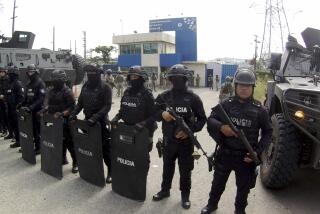Pentagon may step up raids in Pakistan
- Share via
WASHINGTON — Even as angry protests spread in Pakistan, Pentagon officials said Thursday that the number of cross-border commando missions may grow in coming months to counter increasing violence in Afghanistan.
The developments threatened to aggravate U.S.-Pakistani tensions just before the country’s presidential election Saturday, in which attitudes toward the United States are likely to be a key issue. The U.S. raid Wednesday and its aftermath also fanned a long-standing debate within the Bush administration over how to deal with militants in Pakistan.
Pakistani officials said U.S. troops flew into South Waziristan by helicopter in the raid and that as many as 20 people were killed, many thought to be civilians. The White House, State Department and Pentagon all moved to clamp down on administration discussion of the assault, but government officials confirmed the broad details provided by the Pakistani government.
U.S. military officials insisted that there was no new policy authorizing an increase in raids into Pakistan. Assaults by U.S. special operations forces into Pakistan have taken place before, and U.S.-operated unmanned aircraft have attacked sites believed to be used by militants.
But pressure has been building within the military for more aggressive use of existing practices as U.S. casualties have increased with the rising number of attacks carried out in Afghanistan by militants based in Pakistan.
“You can’t allow a haven,” said a military officer, who, like others, spoke on condition of anonymity about the raid. “You have to get to the areas that they rest, relax and train.”
Many within the Pentagon and among military officers in the region are skeptical about the value of increased U.S. operations in Pakistan. These officials believe that stepped-up operations risk a backlash and that a better approach would be to steadily press the Pakistani military to take on the extremists.
In Pakistan, parliament passed a resolution Thursday condemning the raid, a day after the government lodged a diplomatic protest with the U.S. ambassador.
The frequency of U.S. raids in the future may depend on the Pakistani reaction. U.S. officials are monitoring both the public response and the private reaction from leaders of the fledgling Pakistani government. Some military officials considered the initial Pakistani response relatively restrained, although protests continued to build.
Military officials said that the U.S. had used existing authorities negotiated with former President Pervez Musharraf to launch the raid. A senior military official said the volatile political situation in Pakistan had prevented any new negotiations for U.S. operations in the country.
The U.S. has long claimed the right to cross the border in “hot pursuit” of militants. Although the details are unclear, Wednesday’s raid does not appear to be a case of hot pursuit.
A U.S. official suggested that the raid was conducted in response to border attacks, and that no high-ranking militant leader was captured or killed.
“There are targets other than formally designated high-value targets,” the official said.
U.S. special operations forces have conducted raids before, including a 2006 mission in which the elite SEAL Team 6 went into Damadola to attack an Al Qaeda compound.
In a new report of an attack, villagers and officials in North Waziristan on Thursday reported a missile strike they said was carried out by a U.S. aircraft, an unmanned Predator drone. The blast was said to have killed eight people, five of them identified by local officials as “foreigners.” That term is often used to describe Al Qaeda militants from Arab countries or Central Asia. It was not immediately known whether any was a high-profile insurgent figure.
U.S. intelligence officials said the raid Wednesday was along the border, not deep in tribal areas. Officials have noted that boundaries are in dispute in many locations.
White House and State Department spokesmen refused to discuss the incident and limited their remarks to calls for cooperation with the Pakistani government.
Adm. Michael G. Mullen, chairman of the Joint Chiefs of Staff, and other senior U.S. military officials met with the Pakistani army chief of staff, Gen. Ashfaq Kayani, last month aboard the aircraft carrier Abraham Lincoln. A senior Defense official said that there was no discussion of increased action by the United States. Instead the meeting focused on how the U.S. could help the Pakistani military increase its counterinsurgency efforts.
But a senior Pentagon official said that pushing for more aggressive action by the new Pakistani government also carries risks. Any Pakistani politician perceived to favor more U.S. latitude in Pakistan would suffer, the Pentagon official said.
“If you want to lose,” the official said, “just be the one that gets caught talking to [Vice President Dick] Cheney about U.S. incursions across your border.”
Saturday’s presidential contest will be decided by members of parliament and the country’s regional assemblies. Asif Ali Zardari, husband of slain former Prime Minister Benazir Bhutto and leader of her Pakistan People’s Party, is the front-runner. Zardari is seen as relatively pro-American, and the recent raid could affect his candidacy.
--
greg.miller@latimes.com
Times staff writers Laura King in Istanbul, Turkey, and Peter Spiegel and Josh Meyer in Washington contributed to this report.
More to Read
Sign up for Essential California
The most important California stories and recommendations in your inbox every morning.
You may occasionally receive promotional content from the Los Angeles Times.













